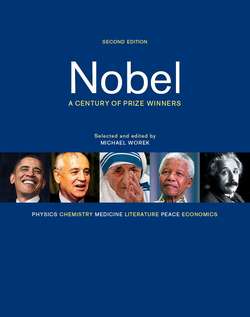Читать книгу Nobel - Michael Worek - Страница 50
На сайте Литреса книга снята с продажи.
ОглавлениеJules Bordet (1870–1961)
1919 Physiology or Medicine
For his discoveries relating to immunity.
Jules Jean Baptiste Vincent Bordet, a Belgian doctor and microbiologist, achieved international respect as an authority in many areas of bacteriology and immunology, providing the medical sciences with invaluable discoveries in these fields. He was awarded the Grand Cordon de l’Ordre de la Couronne de Belgique in 1930, the Grand Cordon de l’Ordre de Léopold in 1937 and the Grand Croix de la Légion d’Honneur in 1938 besides many others honors. He was a permanent member of the Administrative Council of the University of Brussels, a professor of bacteriology, president of the first International Congress on Microbiology held in Paris in 1930, and he held important positions at the Scientific Council of the Pasteur Institute of Paris and the Royal Academy of Medicine of Belgium.
Jules Bordet was born in Soignies, Belgium, at the beginning of the summer of 1870. He studied at the University of Brussels, where he was made a doctor of medicine in 1892. Two years later he left for Paris to begin his work at the Pasteur Institute. With the experience he gained at this well-respected scientific establishment, Bordet returned to his homeland in 1901 to found a branch of the institute in the Belgian capital.
It was in these two establishments that he worked on developing the diagnosis and treatment of various contagious diseases. He contributed to the foundation of serology, the study of immunized reactions on bodily fluids, and, in partnership with Octave Gengou, he established the basis of serological tests for the propagative organisms of various diseases, including typhoid, tuberculosis and syphilis. He also discovered the bacteria related to whooping cough. Bordet, besides his work in the laboratories, dedicated time to recording and preserving his knowledge. The Traité de l’immunité dans les maladies infectieuses (Treatise on Immunity in Infectious Diseases) was one of his main works.
In 1919 he received the highest distinction for his work on immunology, the Nobel Prize in Physiology or Medicine. On the day of the award ceremony, Bordet’s medal and diploma were presented to a high-ranking official of the Belgian state since the laureate was giving a speech in the United States at the time.
He was married to Marthe Levoz in 1899 and was a father of three. His son Paul decided to follow in his footsteps, also becoming a professor of bacteriology, and succeeded him as head of the Pasteur Institute in Brussels. When he died in the Belgian capital, Jules Bordet had a worthy scientific successor in his son.
